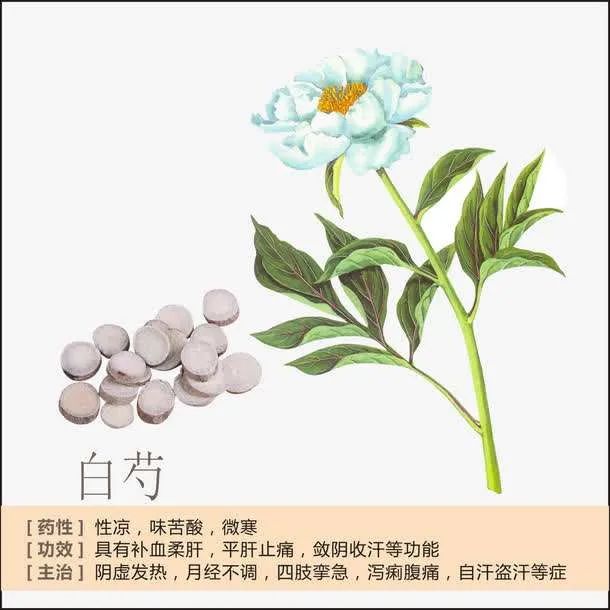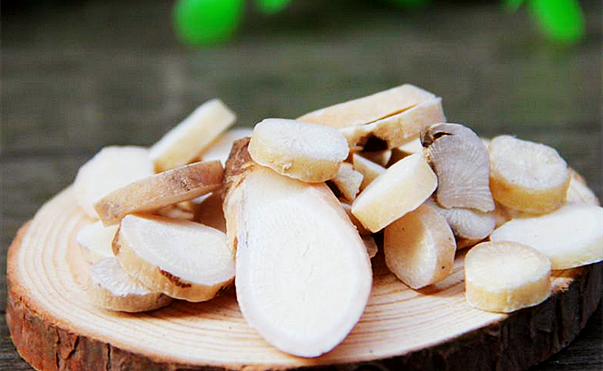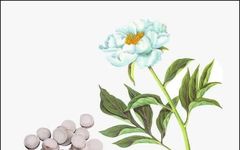Bai Shao (White Peony)
The root of the plant Paeonia lactiflora Pall. from the family Paeoniaceae, primarily produced in Zhejiang, Anhui, and Sichuan provinces. First recorded in the “Bencao Jing Jizhu”. The “Shennong Bencao Jing” states: “It is used for abdominal pain caused by evil qi, stops pain, promotes urination, and benefits qi.”
Properties: Bitter, sour, and cool.
Meridians: Liver (Gan) and Spleen (Pi) meridians.
Functions: Nourishes blood and astringes yin, softens the liver and alleviates pain, and pacifies liver yang.
Indications: Liver blood deficiency, irregular menstruation, disharmony between liver and spleen, pain in the chest, hypochondrium, and abdomen, limb cramps and pain, hyperactive liver yang, headaches, dizziness, etc.

Chi Shao (Red Peony) and Bai Shao (White Peony) were historically interchangeable, but differentiated during the Song and Yuan dynasties. The “Bencao Qiuzhen” provides a detailed description: “Chi Shao and Bai Shao have similar therapeutic effects, but Bai Shao has the ability to astringe yin and nourish the blood, while Chi Shao is more focused on dispelling evil and promoting blood flow; Bai Shao can drain wood from the earth, while Chi Shao can invigorate stagnation in the blood.”
Bai Shao has various processing methods, and its efficacy changes accordingly. Ancient processing methods were numerous, but the main modern preparations include Sheng Bai Shao (raw white peony), Chao Bai Shao (fried white peony), Jiu Bai Shao (wine-prepared white peony), Cu Bai Shao (vinegar-prepared white peony), and Tu Chao Bai Shao (earth-fried white peony).
(1) Sheng Bai Shao excels at nourishing blood and astringing yin, pacifying liver yang, and is used for blood deficiency, irregular menstruation, dysmenorrhea, metrorrhagia, headaches, dizziness, tinnitus, irritability, and spontaneous sweating or night sweats.
(2) Chao Bai Shao has a milder nature, primarily nourishing blood and astringing yin, used for abdominal pain and diarrhea due to liver excess and spleen deficiency, or chronic diarrhea, with abdominal pain that prefers pressure and warmth.
(3) Jiu Bai Shao has reduced sour and cold properties, good for harmonizing the middle and alleviating urgency, used for pain in the hypochondrium, abdominal pain, and postpartum abdominal pain.
(4) Cu Bai Shao primarily enters the liver and excels at astringing, functions to stop bleeding and soothe the liver, relieving depression.
(5) Tu Chao Bai Shao can utilize the earth’s energy to enter the spleen, enhancing its ability to soften the liver and spleen and stop diarrhea, indicated for liver yang and spleen deficiency diarrhea, or chronic diarrhea with a preference for warmth and pressure.

Examples of Indications
1. Liver blood deficiency, irregular menstruation: Often used in combination with Shu Di (Rehmannia) and Dang Gui (Angelica) to treat liver blood deficiency, pale complexion, dizziness, palpitations, or irregular menstruation and metrorrhagia.
2. Disharmony between liver and spleen, pain in the chest, hypochondrium, and abdomen, limb cramps and pain: Often combined with Chai Hu (Bupleurum), Dang Gui, and Bai Shao to treat blood deficiency and liver stagnation, hypochondriac pain. It can also treat abdominal pain and diarrhea due to spleen deficiency and liver excess, or abdominal pain and dysentery due to blood deficiency leading to muscle cramps and pain.
3. Hyperactive liver yang, headaches, dizziness: This herb nourishes blood, astringes yin, and pacifies liver yang.
4. For external wind-cold, sweating due to disharmony of Ying and Wei, it can astringe yin and harmonize Ying, used with Gui Zhi (Cinnamon Twig) to regulate Ying and Wei; for yin deficiency night sweats, it should be used with Long Gu (Dragon Bone) and Fu Xiao Mai (Floating Wheat) to effectively astringe yin and stop sweating.
Dosage and Administration:
Internal Use: Decoction, 5-12g; or in pills or powders. Large doses can be 15-30g. For calming liver yang, it is used raw; for nourishing and softening the liver, it is used fried.
Contraindications: Avoid with Li Lu (Veratrum).
1. Bai Shao is a cold and cool herb; it is not suitable for large doses in cases of external wind-cold, internal cold injury, spleen and stomach deficiency with cold, or kidney yang deficiency. Women with irregular menstruation due to deficiency and cold should not take it in large amounts; those with qi deficiency and spontaneous sweating, or yang deficiency sweating should avoid it.
2. Bai Shao’s sour and cold nature is contraindicated in cases of yang collapse in the upper jiao or rashes.
3. Bai Shao has a central nervous system inhibitory effect; it is contraindicated in comatose patients; infants and the elderly should not take it in large amounts for extended periods.
4. Pregnant women should not take it in large amounts postpartum.
Introduction
Xue Qinghai
Chief pharmacist at the China Academy of Chinese Medical Sciences, chief consultant of the pharmacy, drug safety supervisor in Dongcheng District, and reviewer for journals such as “Chinese Journal of Basic Medicine in Traditional Chinese Medicine” and “Chinese Journal of Medical Science”.
END
(Images from the internet, please delete if infringing)

